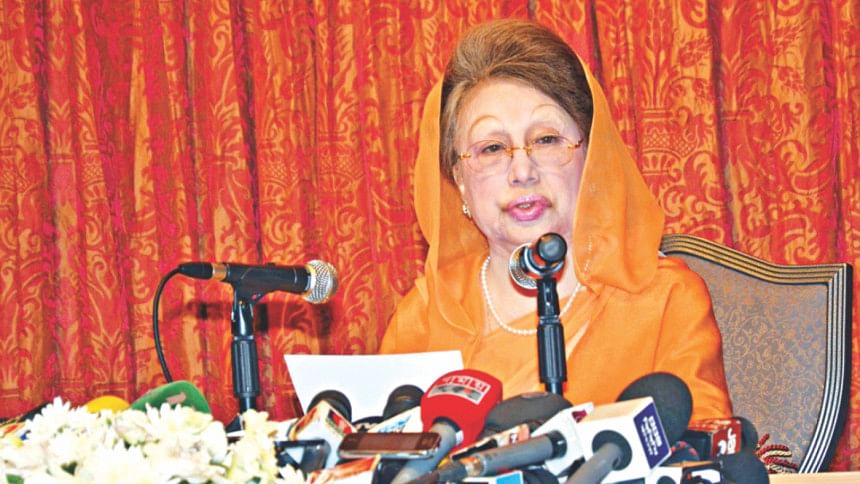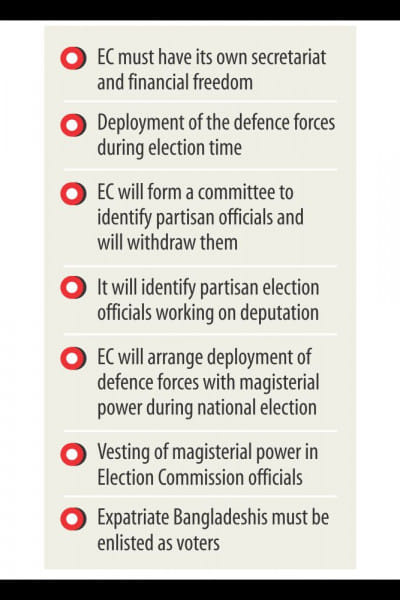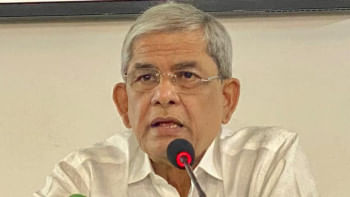Consensus of all parties a must to form next EC

With a call for forming the next Election Commission on the basis of "consensus" among all political parties, BNP Chairperson Khaleda Zia yesterday rolled out a 13-point proposal for its formation.
The former premier said she would unveil a framework for a neutral polls-time government at an appropriate time, as only an impartial Election Commission is not enough for holding a free and fair election.
"The president should constitute a search committee on the basis of consensus among all registered political parties or the ones that had representation in parliament at different times since the country's independence," she said at a press conference at a city hotel.
The committee would pick the chief election commissioner and four commissioners, said Khaleda.
The BNP came up with the proposal as the five-year tenure of the current EC headed by Kazi Rakibuddin Ahmad expires in February next year.
In her 13-point proposal, the BNP chief proposed bringing some amendments to the Representation of the People Order (RPO). The proposals include reinstatement of the clause that defines "the Defence Services of Bangladesh” as “a law enforcement agency” along with the other forces.
Khaleda also focused on strengthening the EC, and stressed the need for vesting magisterial power in EC officials, appointing election observers, delimitating constituencies and updating the voter list.
There is no alternative to an impartial, honest, brave and efficient EC for holding a free and fair election, she said, adding that people's confidence in the electoral system has been shattered.
Khaleda pointed out that only formation of a neutral EC would not be enough to hold a free, fair and inclusive election, as it would require all-out administrative and logistic support of the government, law enforcement agencies and the defence forces.
“... We will spell out before the nation a framework of a neutral election-time government at an appropriate time.”

SEARCH COMMITTEE
The search committee would be comprised of five members, and its convener can be a retired chief justice (according to the order of seniority), who never held any office of profit of the government, Khaleda explained.
The other committee members could be picked from retired judges of the Supreme Court or retired secretaries, or renowned educationists. A senior woman may also be included in the committee, according to the proposal.
She said all registered political parties would hold meetings with the president separately and recommend two names for each post and provide details of the nominees.
Since there are two major political alliances -- the BNP-led 20-party combine and the Awami League-led grand alliance -- in the country, each of the two would pick one representative and his two assistants for holding discussions with the president, mentioned Khaleda.
The president may also involve in the discussion honest, qualified and impartial representatives of the civil society, she added.
FORMATION OF EC
The BNP chief said the person, who would hold the post of CEC, should be highly respected, above all controversies and a non-partisan in every sense.
The next CEC could be picked from former secretaries, who retried at least three years ago, or eminent citizens. But he must not hold any office of profit of the government, she said.
Khaleda, however, mentioned that a former cabinet secretary would not be eligible for the post.
The commissioners could be chosen from retired judges not below the rank of district judge, retired defence personnel not below the rank of brigadier general, retired government officials not below the rank of joint secretary, senior advocates of the SC, educationists with a minimum five years of administrative experience (dean/provost/principal) or widely respected eminent citizens.
Upon getting the proposed names for the posts of CEC and commissioners from the political parties, the president would send those to the search committee.
The committee would choose two names for the post of CEC and eight for the posts of commissioners from the list sent by the president.
After scrutiny, it would pick the common names proposed by the political parties, and then send those to the president.
During this process, if two names for the post of CEC and eight names for the posts of commissioners are not found to be common, the committee would hold discussions (repeatedly, if required) with all registered political parties.
At this point, if any political party intends to submit new names for consideration, the committee would entertain it for the sake of consensus. The committee, in this manner, would finalise the rest of the names on the basis of consensus among the political parties.
The committee would then give the president a list of 10 names -- two for the post of CEC and eight for the posts of commissioners. And the president would pick the CEC and four commissioners from the list.
“If both the persons recommended by the search committee for the post of the chief election commissioner refuse to take the job, the same selection process would be repeated,” said the proposal, adding that the same thing would happen in case of appointment of the commissioners.
Senior leaders of the BNP and its alliance partners, and diplomats from 10 countries, including the USA, the UK, Russia and Sri Lanka, were present at the press conference.

 For all latest news, follow The Daily Star's Google News channel.
For all latest news, follow The Daily Star's Google News channel. 



Comments